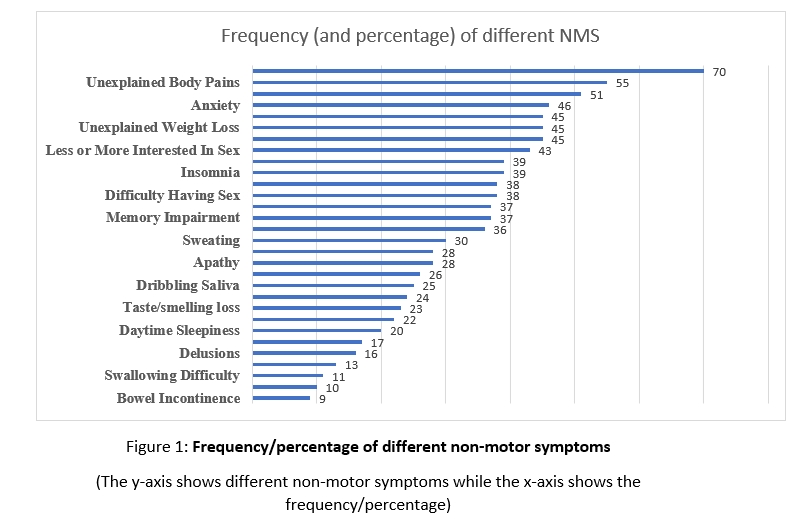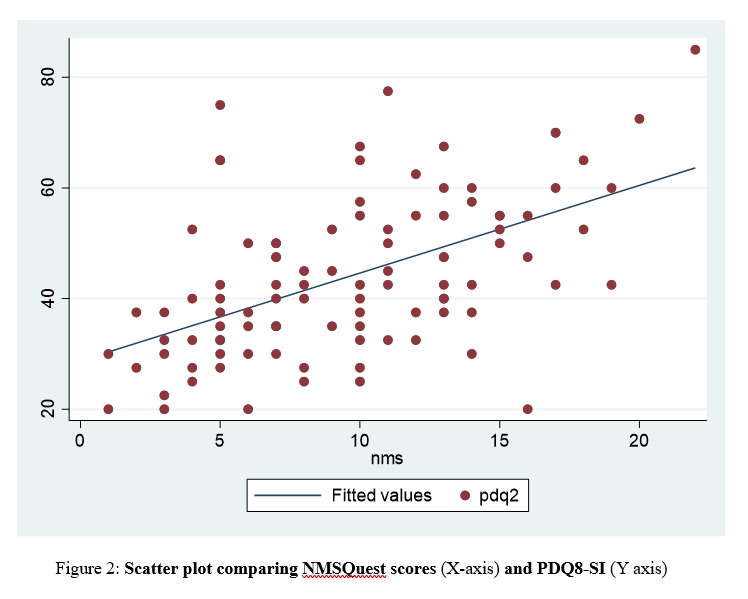Category: Parkinson's Disease: Non-Motor Symptoms
Objective: To determine the prevalence and types of non-motor symptoms (NMS) and their relation to quality of life among Parkinson’s disease (PD) patients who attend the adult neurology clinic of the Korle-Bu Teaching Hospital (KBTH).
Background: Systematic reviews of PD call for more research into its epidemiology in the sub-Saharan region, especially as Africa sees an increase in its aged population. NMS of Parkinson’s cause significant morbidity and can affect health related quality of life (HRQoL).
Method: KBTH is a tertiary hospital located in Accra, Ghana and is the third largest referral center in Africa. This was a cross-sectional hospital-based study involving 100 patients with PD who attended the adult neurology clinic during a 9-month period.
Using a self-administered questionnaire, demographic data, disease duration and stage, presence of NMS using the Non-Motor Symptoms Screening Questionnaire (NMSQuest), HRQoL using the Parkinson’s Disease Questionnaire-8 (PDQ-8) and medical co-morbidities were assessed.
Data was analysed, using Excel 365 and Stata v14, to identify any correlations between number of NMS, patient characteristics, disease stage, disease duration, and HRQoL, while adjusting for potential confounders.
Results: 100% of the patients recruited had at least one NMS. The most common were nocturia (70%) and unexplained body pains (55%) – Fig.1.
The mean NMSQuest score was 9.66±4.81 overall. Mean NMSQuest scores were higher in patients with more advanced disease: 7.95±4.43, 9.03± 4.10, 10.52±4.78 and 10.86± 5.74 in patients at Hoehn and Yahr stage 1, stage 2, stage 3 and stage 4 respectively. However, there were no statistically significant differences between these group means as determined by one-way ANOVA (F=1.78, p = 0.16).
The median PDQ8 summary index (PDQ8-SI) score was 42.5% (IQR 32.5 – 53.75). There was a moderate positive correlation between NMSQuest scores and PDQ8-Summay Index (r=0.534, p<0.001) – Fig 2, with a modelled relationship on regression analysis (aβ=1.76, p<0.001, [1.28-2.24]).
There was no statistically significant correlation between disease duration and NMSQuest score, as well as between disease duration and PDQ8-SI.
Conclusion: The burden of NMS among PD patients who attend the adult neurology clinic of KBTH was moderate to severe and was associated with worse HRQoL. Lack of formal education was also associated with a negative effect on HRQoL.
References: Dementia and Brain Aging in Low- and Middle-Income Countries, Dec. 6-9, 2022, Nairobi, Kenya
Quarshie JT, Mensah EN, Quaye O, Aikins AR. The Current State of Parkinsonism in West Africa: A Systematic Review. Aasly J, editor. Vol. 2021, Parkinson’s Disease. Hindawi Limited; 2021. p. 1–16.
About us – Brief History – Korle-Bu Teaching Hospital. [cited 2023 Feb 26]. Available from: https://kbth.gov.gh/brief-history/
To cite this abstract in AMA style:
D. Brodie-Mends, F. Duodu, K. Nkromah, A. Akpalu. Assessing non-motor symptoms and associations with quality of life among patients in Korle-Bu Teaching Hospital, Ghana [abstract]. Mov Disord. 2023; 38 (suppl 1). https://www.mdsabstracts.org/abstract/assessing-non-motor-symptoms-and-associations-with-quality-of-life-among-patients-in-korle-bu-teaching-hospital-ghana/. Accessed April 26, 2025.« Back to 2023 International Congress
MDS Abstracts - https://www.mdsabstracts.org/abstract/assessing-non-motor-symptoms-and-associations-with-quality-of-life-among-patients-in-korle-bu-teaching-hospital-ghana/


